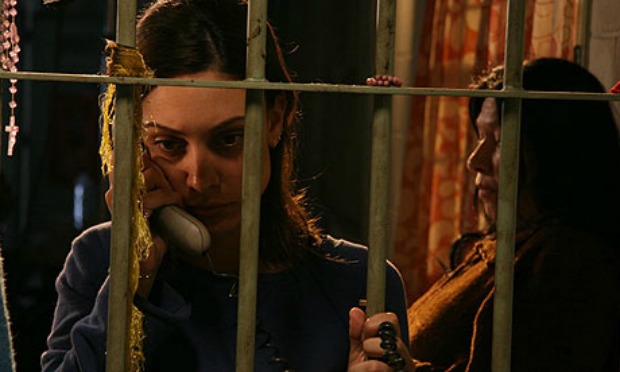Lion’s Den
An English professor, one year after the sudden death of his boyfriend, is unable to cope with his typical days in 1960s Los Angeles.
Plot summary
An incarcerated woman struggles to raise her son from prison.

With his fifth feature Argentinian director/writer Pablo Trapero offers an intelligent and unorthodox take on a well worn subject. Essentially a prison drama, Lion’s Den is a surprising and sincere film that won plaudits at last year’s Cannes, Toronto and London film festivals. Martina Gusman has rightly been singled out for her performance as Julia but a brilliant supporting cast make it feel like an ensemble effort.
When Julia is imprisoned for a crime she can’t remember, her pregnancy proves both a curse and a blessing. She is segregated from the harsher reality of the main prison in a cell block for young mothers but her circumstances remain bleak and she is faced with the prospect of bringing up her son in jail. Moreover, Argentine legislation and the return of her long absent mother combine to put her custody of Tomas in jeopardy.
The first scene is an exercise in expectations created to be undermined and allows for subtle subversion rather than simple twists and tricks of plot. Julia discovers two prone and bleeding figures in her decoratively blood-spattered apartment. Her boyfriend lies dead but Ramiro (Rodrigo Santoro) his lover survives and becomes the other suspect in his murder. That we only get to see the artfully photographed, chilling stillness of the murder’s aftermath is a clue as to the way the film then shifts. After a disorienting opening it slows down to breathe in the spaces between the drama. The rhythm the film finds is out of sync with the first sequence. This creates a breaking point for a re-start with the facts boiled down thus: Julia is in prison. She is pregnant.
Surprisingly little of the story then deals with the murder. Even more surprising is that ignoring the dynamics of what looked to be a strange and abusive love triangle doesn’t seem totally ridiculous. Ramiro returns to visit Julia and to appear in court but the trial subplot is a mess of loose ends. Once led to suspect Ramiro, no good reason is offered as to why Julia is sentenced and he is set free. Though he is very handsome. That might be it.
The true substance of the film then is a realistic portrait of a women’s prison and Julia’s life through pregnancy and early motherhood as an inmate. Her grim new home is a place where relationships are mediated by bars or the dehumanising effect of jail. Vanity and privacy are luxuries of the outside world. Julia, baptised by indignity and anguish soon becomes pretty resilient. She eventually feels almost secure in a grey world where children and a sense of community provide hopeful flashes of colour.
Relationships between Julia and the many characters in her orbit in the Lion’s Den are a jumbled assortment. Everyone seems capable of compassion and selfishness and the emotional smarts of the writing and performances mean that it is never clear whether someone has their own or Julia’s interests at heart. Ramiro manages to embody both treachery and warped romanticism. Her mother, (Elli Medeiros) returns to Argentina after 13 years in France but eventually betrays Julia to take Tomas away. Marta, who shares with Julia the most loving relationship of the film, initially offers help only in exchange for payment or favours. This tactic of uniform moral ambiguity eventually proves a touch artificial. When a riot is started Trapero can’t even bear to make the chief guard a lone scoundrel. He was complicit in her son being taken (bad man) but after bargaining with her, he offers a hug (good man). What a crazy contradiction.
Trapero has said that he intended to build, “not only a cinematographic tale but room for debate and reflection” but I wonder whether it’s the second part that won out. Authenticity was secured in part by shooting in prison with current inmates as extras and real staff taking on minor roles. But it seems possible that the filmmakers got so close to the subject matter that their instincts went askew. Possibly over-sensitive about the real lives behind the story, the films stops so far short of melodrama it sometimes feels detached and voyeuristic. Its sense of ethics is honourable but for what it wants to do, a documentary might have been more apt and sadly, more potent.
Without being too visible Trapero’s direction is admittedly pretty impressive. He has a neat way of revealing dramatic details by framing them subtly as if to say, ‘don’t look at me, I’m incidental.’ In this way the film as a whole handles an overly dramatic plot with amazing discretion. Plenty happens, but somehow it manages to feel intimate and measured; somehow Lion’s Den tells a tale spanning years of extraordinary circumstances at a walking, talking pace.
While this is an accomplished piece of cinema, it falters in overestimating the importance of being earnest. Preoccupied with not making moral or political judgements it sacrifices being a good film in the interest of being more even-handed. Once Julia is imprisoned, its discipline and refusal to overplay dramatic moments make it a worthwhile study in objectivity, but sustaining this portrait in various shades of grey left me wanting a dose of villainy, fantasy or plain old bias. Its faults left me befuddled and its emotive impact often seems undermined by a compulsion for integrity over drama. In its favour though is a visual confidence that just about lifts it above lesser art-house fare to become a provocative story of confinement, resilience, motherhood and love.











COMMENTS